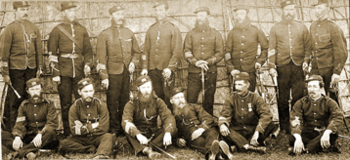East Indian Railway Regiment: Difference between revisions
Jump to navigation
Jump to search
No edit summary |
No edit summary |
||
| Line 4: | Line 4: | ||
Rudyard Kipling wrote in 1888, in respect of Jamalpur, | Rudyard Kipling wrote in 1888, in respect of Jamalpur, | ||
:"On Tuesdays and Fridays the volunteers parade. A and B Companies, 150 strong in all, of the E.I.R. Volunteers, are stationed here with the band. Their uniform, grey with red facings, is not lovely, but they know how to shoot and drill. They have to. The ‘Company’ makes it a condition of service that a man must be a volunteer; and volunteer in something more than name he must be, or some one will ask the reason why. Seeing that there are no regulars between Howrah and Dinapore, the ‘Company’ does well in exacting this toll"<ref>Among the Railway Folk by Rudyard Kipling 1888. Web edition published by eBooks@Adelaide</ref> | :"On Tuesdays and Fridays the volunteers parade. A and B Companies, 150 strong in all, of the E.I.R. Volunteers, are stationed here with the band. Their uniform, grey with red facings, is not lovely, but they know how to shoot and drill. They have to. The ‘Company’ makes it a condition of service that a man must be a volunteer; and volunteer in something more than name he must be, or some one will ask the reason why. Seeing that there are no regulars between Howrah and Dinapore, the ‘Company’ does well in exacting this toll"<ref>Among the Railway Folk by Rudyard Kipling 1888. Web edition published by eBooks@Adelaide</ref> | ||
By 1906, the Corps was 2,300 strong, with the Armoury and Head Quarters staff located at Jalampur.<ref> [http://www.archive.org/stream/historyeastindi00huddgoog#page/n297/mode/1up/ History of the East Indian Railway] , page 243 by George Huddleston 1906 Archive.org</ref> | |||
==Chronology== | ==Chronology== | ||
Revision as of 06:50, 12 April 2010

The East Indian Railway Regiment were an auxiliary regiment under the Bengal command. They included staff of the East Indian Railway.
Rudyard Kipling wrote in 1888, in respect of Jamalpur,
- "On Tuesdays and Fridays the volunteers parade. A and B Companies, 150 strong in all, of the E.I.R. Volunteers, are stationed here with the band. Their uniform, grey with red facings, is not lovely, but they know how to shoot and drill. They have to. The ‘Company’ makes it a condition of service that a man must be a volunteer; and volunteer in something more than name he must be, or some one will ask the reason why. Seeing that there are no regulars between Howrah and Dinapore, the ‘Company’ does well in exacting this toll"[1]
By 1906, the Corps was 2,300 strong, with the Armoury and Head Quarters staff located at Jalampur.[2]
Chronology
- 1869 raised on 17th July as East Indian Railway Volunteer Rifle Corps by GGO 759[3]
- 1892 the Sibpore College Volunteer Rifle Corps amalgamated with the regiment on 20th May 1892 by GGO No.505[3][4]
- 1917 1st April became 7th East Indian Railway Battalion and amalgamated with St Michael's School Cadet Corps[5]
- 1918 redesignated the 7th East Indian Railway Corp on 8th November[5]
- 1920 redesignated East Indian Railway Regiment on 1st October[5]
- 1926 the Oudh and Rohilkhand Railway Battalion were amalgamated[5]
Details
In 1901:[3]
- Headquarters - Jamalpore
- Uniform - Khaki drill
- Motto - "Strong without Rage."
By 1940:[5]
- Uniform - Khaki
- Facings - White
- Badge - Crest of the East India Railway Company surmounted by a crown which is encircled by a laurel wreath with the words "East Indian Railway Regiment Auxillary Force" and the motto.
- 2 battalions
Notes
- ↑ Among the Railway Folk by Rudyard Kipling 1888. Web edition published by eBooks@Adelaide
- ↑ History of the East Indian Railway , page 243 by George Huddleston 1906 Archive.org
- ↑ 3.0 3.1 3.2 Indian Army List 1st Sept 1901
- ↑ Jackson (1940) gives the year as 1890.
- ↑ 5.0 5.1 5.2 5.3 5.4 Jackson, Major Donovan India's Army (1940)